Table of Contents
Have you ever been surprised by the darker colour of your urine in the toilet? This situation is one of the most common indicators of insufficient water intake. When you add dry mouth, headache or dizziness, it is very likely that you need to reach for a glass of water as soon as possible. However, its role is not just to refresh or quench thirst. It is essential for our health. Without sufficient fluid intake, our kidneys and other bodily functions cannot function properly. The water intake should be thought of not only in summer, but in every season.
Personally, however, I also used to be one of those who ignored drinking water for half a day and then I tried to catch up by drinking a few glasses in the evening before I went to bed. This resulted in fatigue, headaches and difficulty concentrating. Not to mention what my kidneys must have been through. Then one day I went to get my in-body measurements and body analysis done and it showed that my body actually feels a few years older than it actually is and that was when I realised that it’s time to think hard about what I’m doing.
Correcting an insufficient water intake was one of the first things on the list that I did. Along with the next steps towards a healthier lifestyle, I gradually began to feel better than ever before. So let’s take a look at the importance of drinking water, which may make you feel better too.
Water that keeps us above water
Have you ever thought about what you really need to survive? Is it food? The air? Facebook? Instagram? And what about water? This beneficial fluid composed of hydrogen and oxygen makes up about 60% of the human body and covers 71% of our planet. It is essential for everything alive and is found in cells or blood vessels.
Our body has a sophisticated water management system that keeps its level in balance and moves to where water is most needed when there is a shortage. It decreases when sweating, breathing, urination and emptying. This is followed by a feeling of thirst, which when ignored leads to dehydration. [1-3] [5] [38]
The main symptoms of dehydration include:
- dry mouth
- muscle weakness
- feelings of thirst
- dark urine
- headache
- urinating less than 4 times a day
- dizziness
As the title of the article suggests, this is not the right path. Drinking is important because water flushes waste out of the body, regulates body temperature and helps the brain work. In addition, all metabolic processes take place in the aquatic environment. [4]
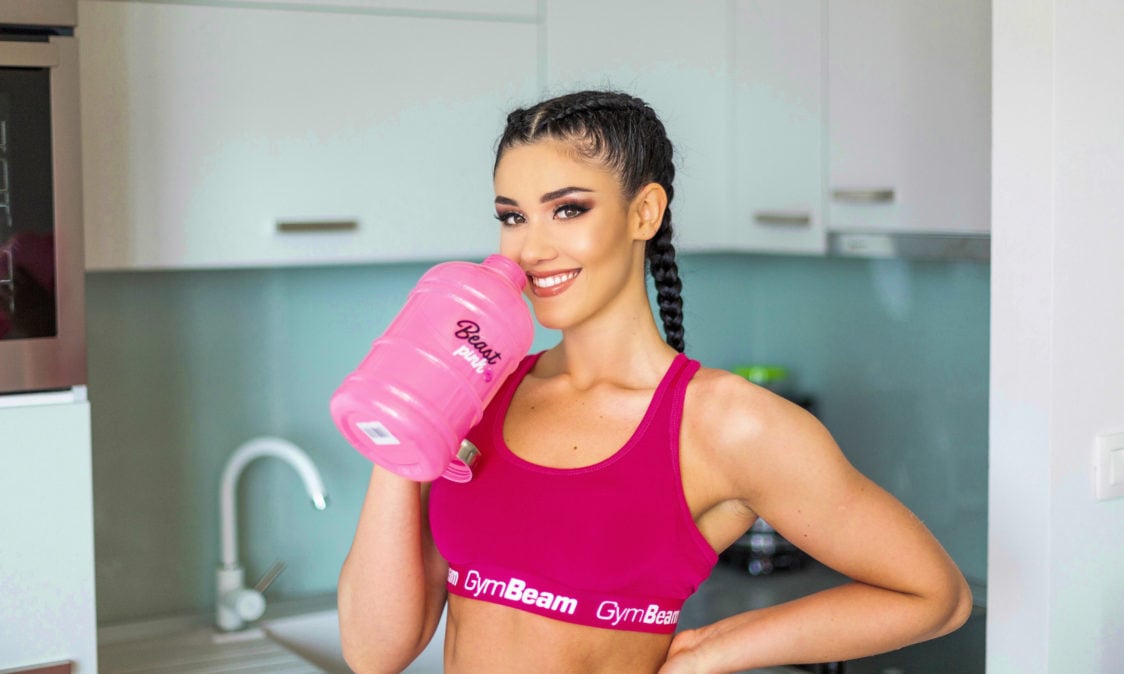
The health benefits of water that are worth paying attention to
Drinking (of course water) is associated with other benefits, which we will present in separate points below.
1. Helps maximize physical performance
With improper hydration your physical performance might not be running at the optimal level. One study showed that dehydration reduced performance in activities that last longer than 30 minutes. Drinking water is therefore particularly important during prolonged intensive training, but especially in case of endurance training. According to studies, dehydration can have a significant effect even if you lose as little as the equivalent of 2% of water of your body weight. The reason for the biggest water losses during sports is sweating.
This popular physical activity is the cause of heat generation, which must be scattered to prevent the body from overheating. Our body is cooled by evaporating sweat (liquids) from its surface. The amount of sweat (excreted water) depends on the length, intensity of performance and the external environment.
For athletes, it is not uncommon to have loses equaling 6 – 10%, which can lead to changes in body temperature regulation, reduced motivation to continue training and increased fatigue. Feelings of exhaustion, dizziness, headache and dry mouth are no exception. This will make your training much harder both physically and mentally. [6-8] [10]
Research has shown that optimal hydration prevents similar effects and may even help reduce oxidative stress during the regeneration phase. It occurs more during high-intensity training. [9]
You might be interested in these products:
However, during physical exercise, it is important to replenish ions lost through sweat, such as sodium, chlorides, potassium, magnesium and calcium. However, sodium is the most important, because it affects the hydration of the body the most of all electrolytes. This is because it increases the retention of fluids in the body.
The typical concentration of sodium in ionic beverages is at the level of 10 – 30 mmol/l. In the case of potassium, it is 0.8 – 2 g/l. The content of ions in beverages thus prevents a phenomenon called hyponatremia. This is a condition where the sodium concentration is lower than 135 mmol/l. Such a deficiency can lead to the collapse of the body. [39 – 40]
Other findings from studies that looked at the effect of water on physical performance include:
- Loss of 1.4% of fluids due to exercise in young women disturbed mood and concentration and increased the frequency of headaches. [15]
- Loss of 1.6% of fluids in young men negatively affected working memory and increased feelings of anxiety or fatigue. [16]
- Mild dehydration can affect mood, memory and brain performance. [17 – 19]
2. It is essential for kidney function
Water makes minerals and nutrients available to the body by dissolving them. In addition, it helps remove waste products that are filtered by kidneys. [13]
The kidneys also take care of:
- regulation of water volume in the whole organism
- excretion of waste substances, drugs and other metabolites
- secretion of hormones that regulate blood pressure (e.g. renin)
- production of the active form of vitamin D
- control of red blood cell production
- primary urine production and treatment for definitive urine (hypertonic)
Water is essential for them to work properly. The kidneys filter about 120-150 litres of fluids every day. Approximately 1-2 litres of them are disposed in the form of urine and the rest passes into the bloodstream. [11-12]
If the kidneys do not have enough water, they are stressed because they have to work much harder to maintain the body’s water management and prevent dehydration. In this case, there may be impaired excretion of waste products and excess fluids that begin to accumulate in the body. This is associated with a higher risk of various kidney disorders and the formation of kidney stones, but also a higher risk of chronic diseases.
Optimal fluid intake, which will be discussed below, is essential for healthy kidney function. Several studies show that optimal water intake can protect the kidneys from chronic disease and thus help maintain their health. [13] [41]
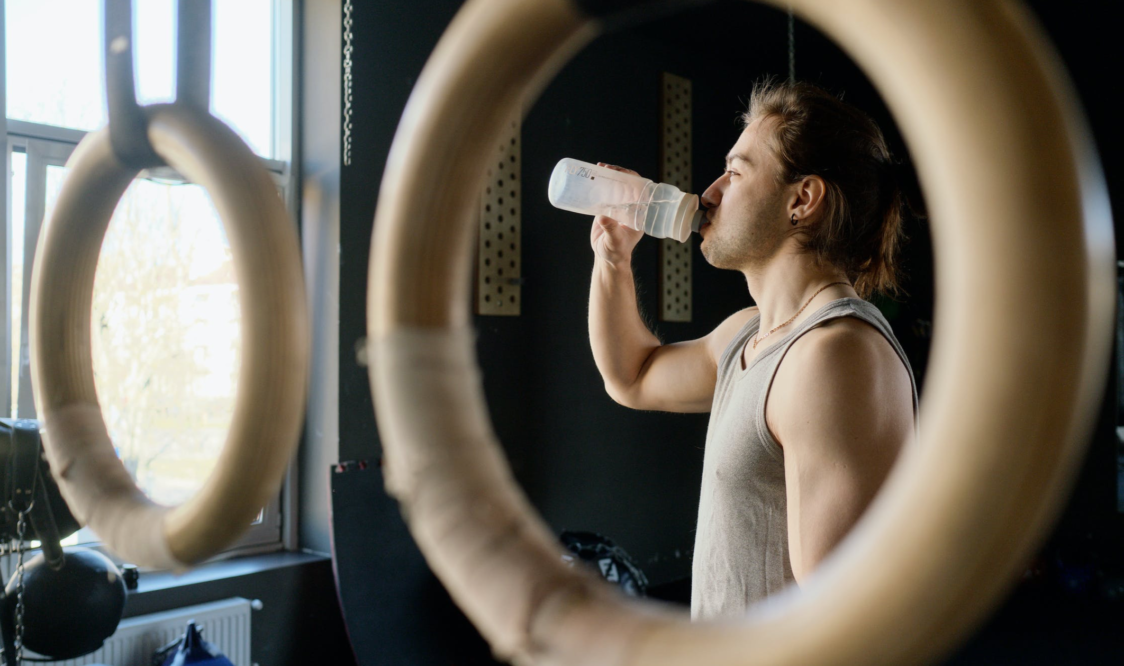
3. Helps fight diseases and headaches
Do you remember the words of the general practitioner, who, after the examination, emphasised next to the rest also sufficient fluid intake? This is because water helps us absorb various vitamins and minerals. In addition, research has shown that it can affect the manifestations of various diseases. [14]
The positive effects of water are manifested especially in the form of:
- constipation
- kidney stones
- urinary tract infection
- high blood pressure (called hypertension)
In addition, for some people, dehydration can also lead to headaches. Several smaller studies have addressed the issue of the impact of water on diseases or headaches, which have come to the following conclusions [8] [20-24]:
- 40% of the 393 participants experienced headache due to dehydration.
- A study of 102 men with migraines found that drinking an extra 1.5 litres of water every day improved the quality of their life.
- Mineral water rich in magnesium and sodium improves stool in people suffering from constipation.
- Increased water consumption can help prevent recurring urinary tract and bladder infections
- In people who had a headache due to lack of water, fluid supplementation caused relief within 30 minutes to 3 hours.

4. It can be beneficial when losing weight
Drinking more fluids can support your goal of losing weight. This is because water can contribute to a feeling of satiety and speed up metabolism. In addition to the course of biochemical processes, energy is also obtained in the aquatic environment. Part of all living cells are the so-called mitochondria, which function as tiny power plants, producing energy for our body.
Studies show that mitochondria work a little better when adequately hydrated than when we are thirsty. Drinking a glass of water before a meal can also prevent you from overeating. A 2014 study also supports the claim that water can actually help when reducing weight.
The study involved 50 overweight women. In addition to their regular consumption of fluids, this group of women drank an additional 500 ml of water 30 minutes before breakfast, lunch and dinner. Participants experienced weight and fat loss. They also reported decreased appetite. [25]
Sodas are also associated with weight gain, and you should replace them with water or non-caloric drinks when trying to lose weight. The authors of the 2012 study found that replacing two or more caloric beverages with non-caloric beverages each day over 6 months contributed to an average weight loss of 2-2.5% in obese women. [26]
If you want to learn more about liquid calories, be sure not to miss our article Where are hidden liquid calories, and how do these empty calories prevent you from losing weight?
Other benefits of sufficient water intake
According to several sources, we can talk about the following benefits in connection with the sufficient fluid intake [27-28]:
- It contributes to the normal production of saliva, which maintains the condition of our oral cavity.
- It makes up 90% of the blood, which, among other things, supplies oxygen to the whole body.
- It contributes to joint health.
- It supports the digestive system.
- It contributes to the functioning of the airways, which are limited when dehydrated.
- In the form of ionic drinks/mineral waters, it maintains the balance of electrolytes that are washed out by sweating, for example during intense training.
- It contributes to the regulation of blood pressure.
- It has an effect on maintaining cognitive performance.
Does water intake affect the quality of the skin?
In connection with water, you could also come across a benefit that mentions that it can improve the quality of the skin. But is it really so? Unfortunately, no. This is one of the most common myths associated with drinking water. Numerous unverified sources suggest that drinking 8 to 10 glasses of water a day flushes toxins out of your skin and gives you a radiant skin colour. However, there is insufficient evidence for such claims. The skin contains approximately 30% water and its structure serves the body as such a waterproofing. The loss of water over the entire surface of the skin also takes place through the sweat glands, which are evenly distributed over most of the body’s surface.
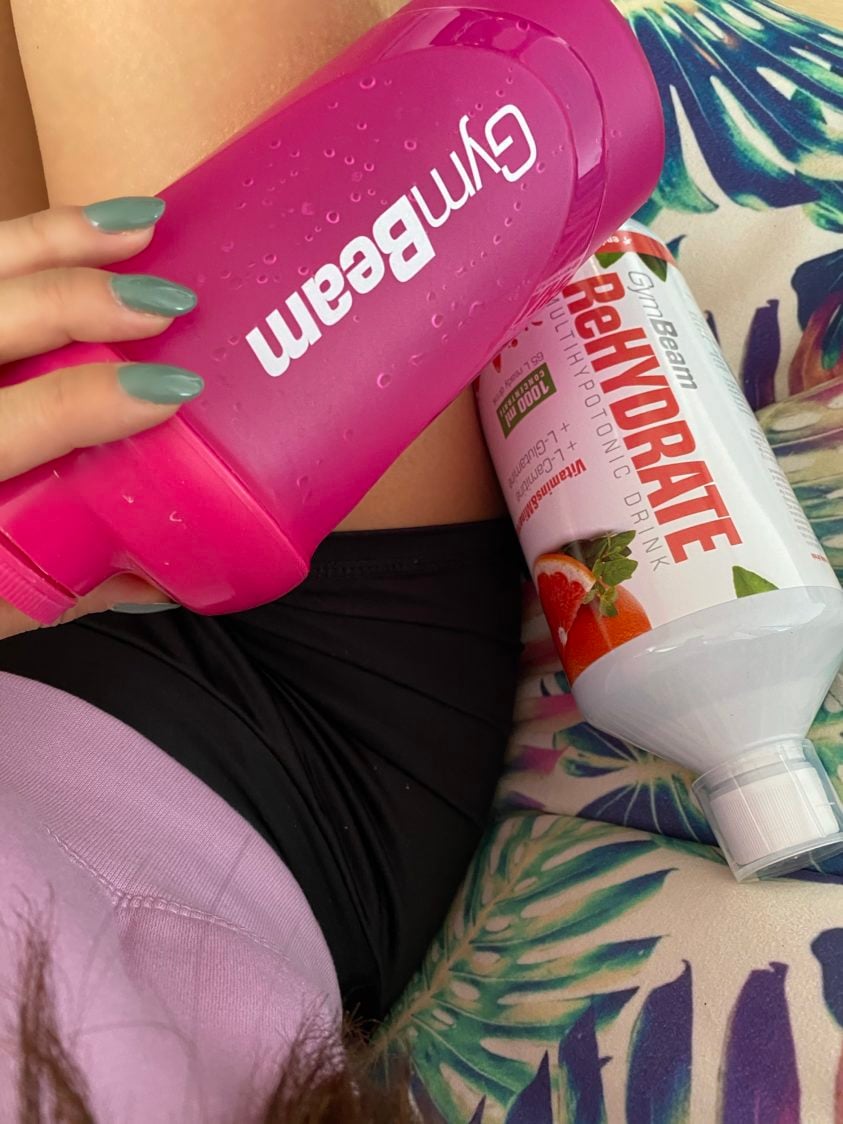
Dry skin is most often associated with exposure to dry air, prolonged contact with hot water, unsuitable soap or medication. Only severe cases of dehydration can affect the skin, which can cause the so-called turgor (high tension) of the skin.
This fact does not play a role in people with adequate hydration. It should be added that adequate hydration is not enough to prevent wrinkles or other manifestations caused by ageing. These are often related to genetics, sunlight or the influence of the environment in which we live. [8]
The recommended amount of water we should drink
Once we know why we should be getting sufficient amount of fluids, another unanswered question is, how much fluids should we drink? The answer depends on many factors and varies from person to person.
The general recommendations of experts from the Institute of Medicine of the National Academies on the water intake are at the level of:
- 2.7 litres for women (approximately 11 cups)
- 3.7 litres for men (approximately 15 cups)
- 30 – 45 ml of water per kilogram of body weight. [42]
About 80% of the recommended amount should come from fluids, including water, and the rest from food. However, water intake also depends on specific factors, such as the climate in which you live, your diet, physical activity, time of year and your health. Moments when drinking is most important include fever, diarrhoea, excessive sweating (physical activity, weather), pregnancy and hot weather. [27] [30] [42]
Sufficient vs. excessive hydration
The need to drink is similar to the mechanism of breathing. You don’t have to worry about how it works, and when the water in your body simply drops below a certain level, you will feel thirsty. To a greater extent, this can be a reliable factor in dehydration, but relying on it may not always be ideal, especially in terms of health or performance. [31]
By the time you feel thirsty, your hydration may be too low, which is also related to the mentioned discomforts such as fatigue or headache. Therefore, the colour of urine may be a more useful signal of sufficient hydration. It should be light or clear, as shown in the following colour scheme. [32]
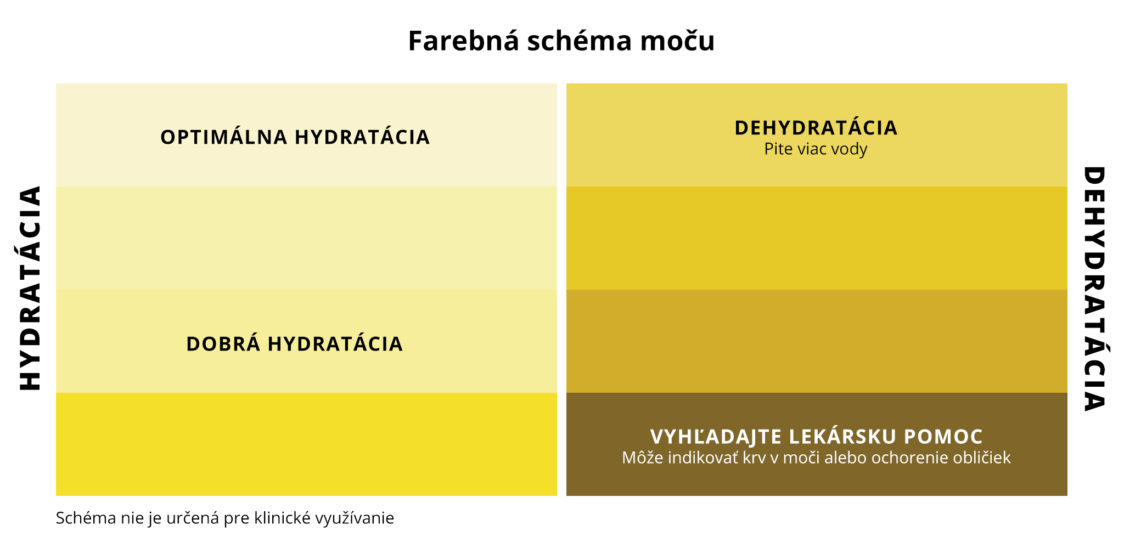
However, problems can also be caused by excessive drinking of water, which in extreme cases leads to intoxication. This happens when the amount of sodium and other electrolytes in your body becomes too thin. This condition is also known as hyponatremia, which is caused by excessive fluid intake, for example during a stressful situation. Intense sports performance can also be a problem, during which most people drink only water without electrolytes. Symptoms of hyponatraemia include behavioural disorders, disorientation, apathy, headache, nausea and vomiting. Sensory disorders, decreased reflexes, convulsions or deeper disorders of consciousness, which can lead to a coma, are no exception.
In most cases, however, excessive hydration is particularly dangerous for endurance athletes who drink large amounts of ion-free water before and during training. These include marathoners/ultramarathoners, endurance cyclists, Ironman triathletes and the like. However, under normal conditions, it is not easy to achieve a state of excessive hydration, because you would have to drink a really large amount of water. How much? [33]
According to a study from 2013, the kidneys can effectively and without major issues flush through about 20 – 28 litres of water (0.8 – 1 litre every hour). An important factor of excessive hydration is not only the amount but also the timeframe. The authors of the study state that the symptoms of hyponatremia can also manifest in people who drink 3-4 litres of water in a short time.
Other specific examples of excessive hydration (hyponatremia) include:
- Soldiers who drank 1.9 litres of water per hour suffered from mood swings, nausea, vomiting or even seizures.
- A 22-year-old man who drank 6 litres of water in 3 hours and suffered from advanced psychiatric and neurological symptoms, including restlessness, strange behaviour and convulsions. As a result of hyponatremia, the concentration of sodium in his body was at a critical level of 120 mmol/l. I would just like to remind you that any amount below 135 mmol/l is already considered hyponatremia.
- A 9-year-old girl who, after consuming 3.6 litres of water in 1-2 hours, vomited, was drowsy and complained of headaches. Her blood test confirmed hyponatremia.
It should be added here that these are situations that do not normally happen, because people generally don’t drink this amount of water in a short time. These situations mainly revolve around plasma sodium levels. This could have affected in some way the individuals mentioned above, and excessive water intake only worsened the whole situation. [34-37]
7 tips on how to ensure a sufficient water intake
Most people tend to have trouble maintaining a sufficient water intake. We often forget about it because of work or other duties. If you feel that you are neglecting your fluid intake, the following tips may help you [30] [37]:
- Try carrying a water bottle with you wherever you go, even at work or on the road
- You don’t have to drink just water. Instead, focus on fluids in general. Other good sources include, for example, milk, protein milkshake, tea, RTD beverage, ready meals or soups.
- Eat fresh vegetables and fruits that are made of up to 80% – 98% water, such as watermelon, strawberries, cucumber, broccoli, cauliflower or spinach. In addition, you will also get beneficial vitamins and minerals from them.
- If you don’t like just clear water, try flavoured powders for making instant and fresh drinks. However, try to choose ones that do not contain sugar and have just a minimum amount of calories. They are a great alternative to classic sweet sodas without unnecessary extra energy.
- During hard workouts, consider drinking ionic drinks, that will replenish your body with electrolytes lost by sweating.
- Try mobile apps that will keep an eye on your water intake and send you notifications.
- You can also improve the taste or nutritional value of pure water by adding flavoured BCAAs, lemon juice or various herbs such as mint or honeysuckle.
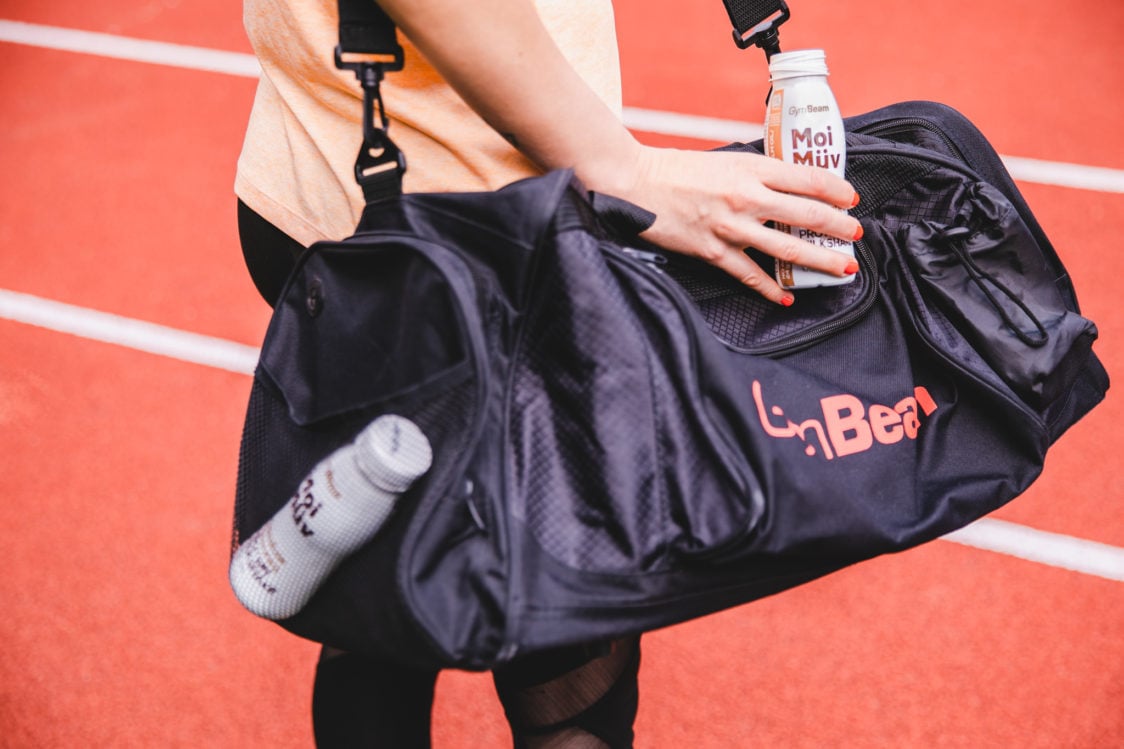
Conclusion
Water is present in all important processes in our body. We cannot exist without it, because it flushes waste out of the body, regulates body temperature and helps the brain to function. All metabolic processes also take place in the aquatic environment. In addition, it is associated with other benefits, such as maximising physical performance or helping to fight diseases. Water is essential for the proper functioning of the kidneys and can also help with weight loss. For all this, it is necessary to pay attention to your water intake.
Generally recommended optimal fluid intake is 2.7 litres for women and 3.7 litres for men. Other recommendations talk about the fluid intake at the level of 30 – 45 ml of water/kg of body weight. However, fluid intake depends on several factors, such as diet, physical activity, climate or sweating. A signal of sufficient hydration may be the colour of the urine, which should be light or clear.
What is your opinion on fluid intake? How much water do you drink? Do you try to follow the recommended amount or do you drink sporadically and mostly less? If you liked the article, please share it so that your friends can also get these useful information.
[1] The Water in You: Water and the Human Body – https://www.usgs.gov/special-topic/water-science-school/science/water-you-water-and-human-body?qt-science_center_objects=0#qt-science_center_objects
[2] How Much Water is There on Earth? – https://www.usgs.gov/special-topic/water-science-school/science/how-much-water-there-earth?qt-science_center_objects=0#qt-science_center_objects
[3] Peter Costa - What you should know about dehydration – https://www.medicalnewstoday.com/articles/153363#symptoms
[4] Natalie Silver - Why Is Water Important? 16 Reasons to Drink Up – https://www.healthline.com/health/food-nutrition/why-is-water-important
[5] Water – https://pubchem.ncbi.nlm.nih.gov/compound/Water
[6] Pamela Jane Magee, Alison M Gallagher, Jacqueline M McCormack - High Prevalence of Dehydration and Inadequate Nutritional Knowledge Among University and Club Level Athletes – https://pubmed.ncbi.nlm.nih.gov/27710146/
[7] David Ayotte, Jr, Michael P. Corcoran - Individualized hydration plans improve performance outcomes for collegiate athletes engaging in in-season training – https://www.ncbi.nlm.nih.gov/pmc/articles/PMC5987390/
[8] Barry M Popkin, Kristen E D'Anci, Irwin H Rosenberg - Water, hydration and health – https://academic.oup.com/nutritionreviews/article/68/8/439/1841926
[9] Il-Young Paik, Myung-Hyun Jeong, Hwa-Eun Jin, Young-Il Kim, Ah-Ram Suh, Su-Youn Cho, Hee-Tae Roh, Chan-Ho Jin, Sang-Hoon Suh - Fluid replacement following dehydration reduces oxidative stress during recovery – https://pubmed.ncbi.nlm.nih.gov/19344695/
[10] Andrew Carlton, Robin Marc Orr - The effects of fluid loss on physical performance: A critical review – https://www.sciencedirect.com/science/article/pii/S2095254615000046
[11] Your Kidneys & How They Work – https://www.niddk.nih.gov/health-information/kidney-disease/kidneys-how-they-work?dkrd=hispt0004
[12] How the Kidneys Work – https://www.seattlechildrens.org/clinics/transplant/kidney/how-the-kidneys-work/
[13] How Your Kidneys Work – https://www.kidney.org/kidneydisease/howkidneyswrk
[14] Friedrich Manz, Andreas Wentz - The importance of good hydration for the prevention of chronic diseases – https://pubmed.ncbi.nlm.nih.gov/16028566/
[15] Lawrence E. Armstrong, Matthew S. Ganio, Douglas J. Casa, Elaine C. Lee, Brendon P. McDermott - Mild Dehydration Affects Mood in Healthy Young Women – https://academic.oup.com/jn/article/142/2/382/4743487
[16] Matthew S Ganio, Lawrence E. Armstrong, Douglas J. Casa, Brendon P. McDermott, Elaine C. Lee, Linda M. Yamamoto - Mild dehydration impairs cognitive performance and mood of men – https://www.cambridge.org/core/journals/british-journal-of-nutrition/article/mild-dehydration-impairs-cognitive-performance-and-mood-of-men/3388AB36B8DF73E844C9AD19271A75BF
[17] Riebl, Shaun K. M.S., R.D., Davy, Brenda M. Ph.D. - The Hydration Equation Update on Water Balance and Cognitive Performance – https://journals.lww.com/acsm-healthfitness/Fulltext/2013/11000/The_Hydration_Equation__Update_on_Water_Balance.6.aspx
[18] Nathalie Pross, Agnès Demazières, Nicolas Girard, Romain Barnouin, Francine Santoro, Emmanuel Chevillotte, Alexis Klein, Laurent Le Bellego - Influence of progressive fluid restriction on mood and physiological markers of dehydration in women – https://www.ncbi.nlm.nih.gov/pmc/articles/PMC3553795/
[19] F. Hoffmann-La Roche - Effects of Dehydration on Brain Functioning: A Life-Span Perspective – https://www.karger.com/Article/Fulltext/463060
[20] Naila A. Shaheen, Abdulrahman A. Alqahtani, Hussam Assiri, Reem Alkhodair, Mohamed A. Hussein - Public knowledge of dehydration and fluid intake practices: variation by participants’ characteristics – https://www.ncbi.nlm.nih.gov/pmc/articles/PMC6282244/
[21] Mark Spigt, Nico Weerkamp, Jaap Troost, Constant P van Schay - A randomized trial on the effects of regular water intake in patients with recurrent headaches – https://academic.oup.com/fampra/article/29/4/370/492787
[22] Gordana Bothe, Aljaz Coh, Annegret Auinger - Efficacy and safety of a natural mineral water rich in magnesium and sulphate for bowel function: a double-blind, randomized, placebo-controlled study – https://www.ncbi.nlm.nih.gov/pmc/articles/PMC5334415/
[23] Thomas M. Hooton, Mariacristina Vecchio, Alison Iroz, Ivan Tack, Quentin Dornic, Isabelle Seksek, Yair Lotan - Effect of Increased Daily Water Intake in Premenopausal Women With Recurrent Urinary Tract Infections – https://www.ncbi.nlm.nih.gov/pmc/articles/PMC6584323/
[24] Drinking more water reduces bladder infections in women, study finds – https://www.sciencedaily.com/releases/2018/10/181003134447.htm
[25] Vinu Ashok Kumar Vij, Anjali S. Joshi - Effect of excessive water intake on body weight, body mass index, body fat, and appetite of overweight female participants – https://www.ncbi.nlm.nih.gov/pmc/articles/PMC4121911/
[26] Deborah F Tate, Gabrielle Turner-McGrievy, Elizabeth Lyons, June Stevens, Karen Erickson, Kristen Polzien, Molly Diamond, Xiaoshan Wang, Barry Popkin - Replacing caloric beverages with water or diet beverages for weight loss in adults: main results of the Choose Healthy Options Consciously Everyday (CHOICE) randomized clinical trial – https://academic.oup.com/ajcn/article/95/3/555/4578292
[27] James McIntosh - Fifteen benefits of drinking water – https://www.medicalnewstoday.com/articles/290814#benefits
[28] How much water should you drink? – https://www.health.harvard.edu/staying-healthy/how-much-water-should-you-drink
[29] Report Sets Dietary Intake Levels for Water, Salt, and Potassium To Maintain Health and Reduce Chronic Disease Risk
[31] Kris Gunnars - How Much Water Should You Drink Per Day? – https://www.healthline.com/nutrition/how-much-water-should-you-drink-per-day#how-much-you-need
[32] J D Adams, Yasuki Sekiguchi, Hyun-Gyu Suh, Adam D Seal, Cameron A Sprong, Tracie W Kirkland, Stavros A Kavouras - Dehydration Impairs Cycling Performance, Independently of Thirst: A Blinded Study – https://pubmed.ncbi.nlm.nih.gov/29509643/
[33] Are You Hydrated? – https://gacc.nifc.gov/nwcc/content/pdfs/safety/DOD_Urine%20Color%20Test_Poster.pdf
[34] Shawn Radcliffe - Overhydratation – https://www.healthline.com/health/overhydration#causes
[35] Min A Joo, Eun Young Kim - Hyponatremia caused by excessive intake of water as a form of child abuse – https://e-apem.org/journal/view.php?doi=10.6065/apem.2013.18.2.95
[36] K K O'Brien, S J Montain, W P Corr, M N Sawka, J J Knapik, S C Craig - Hyponatremia associated with overhydration in U.S. Army trainees – https://pubmed.ncbi.nlm.nih.gov/11370203/
[37] Mari Yamashiro, Hajime Hasegawa, Akihiko Matsuda, Masanobu Kinoshita, Osamu Matsumura, Kazuo Isoda,Tetsuya Mitaraib - A Case of Water Intoxication with Prolonged Hyponatremia Caused by Excessive Water Drinking and Secondary SIADH – https://www.ncbi.nlm.nih.gov/pmc/articles/PMC3924712/
[38] 5 Best Tips for Staying Hydrated – https://blog.theralogix.com/tips-for-staying-hydrated/
[39] Dehydratation – https://www.nhs.uk/conditions/dehydration/
[40] Bernaciková, M., Masarykova univerzita, & Fakulta sportovních studií. – Regenerace a výživa ve sportu (1. vyd.)
[41] I. Dedinská, V. Maňka, I. Ságová, A. Klimentová, P. Makovický, J. Polko, J. Sadloňová, M. Mokáň - Hyponatrémia - komplikácia liečby karbamazepínom – https://www.casopisvnitrnilekarstvi.cz/artkey/vnl-201201-0014_hyponatremia-carbamazepine-medication-complications.php?back=%2Fsearch.php%3Fquery%3DEndoskopick%25E1%2Bdiagnostika%2Ba%2Bterapie%26sfrom%3D990%26spage%3D30
[42] William F. Clark, Jessica M. Sontrop - Can water intake prevent CKD? A brief review of the evidence – https://www.thelancet.com/campaigns/kidney/updates/can-water-intake-prevent-ckd
[43] Ana Isabel Laja García, Carmen Moráis-Moreno, M de Lourdes Samaniego-Vaesken, Ana M. Puga, Teresa Partearroyo, and Gregorio Varela-Moreiras - Influence of Water Intake and Balance on Body Composition in Healthy Young Adults from Spain – https://www.ncbi.nlm.nih.gov/pmc/articles/PMC6723835/


Add a comment